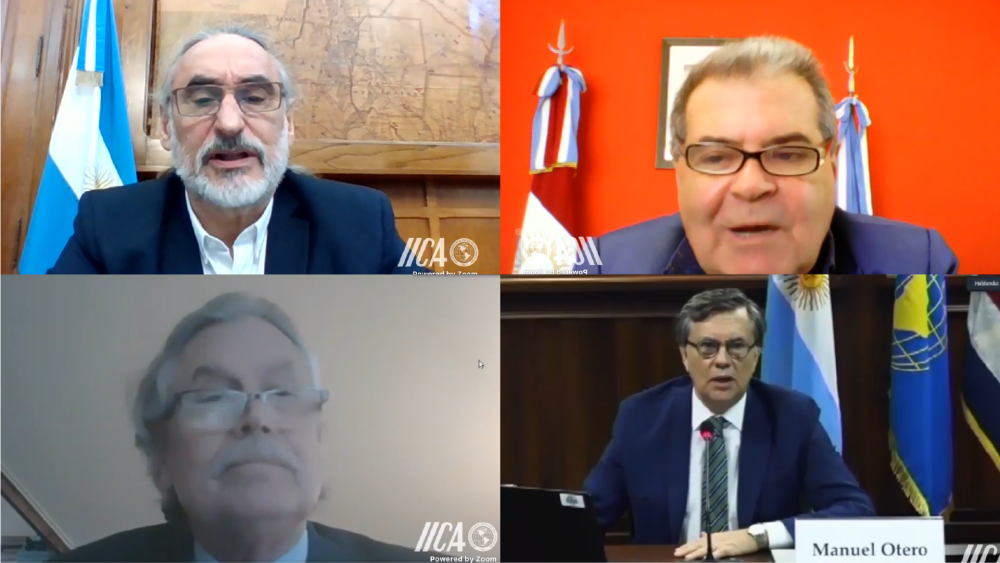This year’s International Conference on Applied Bioeconomy Research, organized by the International Consortium on Applied Bioeconomy Research (ICABR), was co-organized by the Ministry of Agriculture, Livestock and Fisheries of Argentina and IICA.

San Jose, 14 October 2020 (IICA). – For the first time in history, Latin America is hosting the International Conference on Applied Bioeconomy Research. Organized by the International Consortium on Applied Bioeconomy Research (ICABR), the 2020 edition of the event is being held in the region thanks to the support of the Ministry of Agriculture, Livestock and Fisheries of Argentina and the Inter-American Institute for Cooperation on Agriculture (IICA) as co-organizers.
The International Conference on Applied Bioeconomy Research is considered the world’s primary forum for defining, discussing and building up the potential of the bioeconomy for development. Each year, the event attracts the participation and attention of professionals in the field of agricultural sciences and the world’s leading universities and education centers.
Carl Pray, President of the International Consortium on Applied Bioeconomy Research; Luis Basterra, Minister of Agriculture, Livestock and Fisheries of Argentina; Sergio Busso, Secretary of Agriculture and Livestock of the province of Córdoba, Argentina; and Manuel Otero, Director General of IICA, participated virtually in the opening ceremony of the event.
Among the participants on the first day of the conference were Bruno Prosdocimi Nunes, General Coordinator of Bioeconomics at the Ministry of Science, Technology and Innovation of Brazil; Wálter Oyhantcabal and Carolina Balian, of the Sustainability and Climate Change Unit of the Ministry of Livestock, Agriculture and Fisheries (MGAP) of Uruguay; Marcelo Eduardo Alos, Secretary of Food, Bioeconomy and Regional Development of the Ministry of Agriculture, Livestock and Fisheries of Argentina; Mabel Gisela Torres Torres, Minister of Science, Technology and Innovation of Colombia; and Federico Torres Carballo, Deputy Minister of Science, Technology and Telecommunications of Costa Rica.
The province of Córdoba, an agrifood powerhouse located in the central region of Argentina, was due to host the event; however, as a result of the Covid-19 pandemic, the format of the conference had to be modified. Under the current virtual modality, the content and speakers are the same, and the event has succeeded in bringing together the world’s top authorities in the field (further details here).
“We have agreed to utilize the bioeconomy for economic reconstruction and to rebuild our countries for the better. Countries that were previously experiencing economic growth are now facing unemployment, depression and an economic decline. Climate change has only amplified the effects of the pandemic. We believe that the bioeconomy offers a means for stimulating growth and mitigating climate change”, explained Pray.
Minister Basterra expressed “strong support” for the concept of the bioeconomy, and applauded initiatives that foster the generation of goods and services from biomass.
“Córdoba’s experiences demonstrate an orderly and efficient way of consolidating the concept of the bioeconomy and transitioning from local to global initiatives. These experiences are cropping up throughout Argentina, and I dare say that, all over the world, there is a growing interest in finding ways in which society can satisfy its needs and aspirations but in a sustainable manner”, remarked the Argentinean minister.
Secretary Busso, on the other hand, underscored countries’ “political responsibility; we must figure out how to transform these ideas into efficient public policies. Latin America has great potential to develop the bioeconomy because it is an enormous basin for photosynthesis, which sets the region apart; because of its productive diversification that adds value; and because of its development of the rural environment. It is a region with tremendous potential”.
In the same vein, he added that “governments and public policies in the region have not provided the bioeconomy with solutions that are aligned with current needs, as is the case in other regions, such as Europe”.
Referring to the potential of the bioeconomy, Otero noted that this approach opens up the possibility of generating virtuous circles to transform rural communities in the Americas into areas of progress through the development of local bio-based industries.
“We have the opportunity to generate other in-demand products of biological origin for the energy, medical, pharmaceutical and chemical industries”, stated the Director General of IICA.
Otero also highlighted the potential of the bioeconomy to reactivate and strengthen the strategic standing of Latin America and the Caribbean. In that regard, IICA is implementing actions to support the Member States, which are aimed at raising awareness, persuading and driving the development of public policy frameworks and strategies that would allow for capitalizing on new bioeconomy businesses.
More information:
Institutional Communication Division
comunicacion.institucional@iica.int











